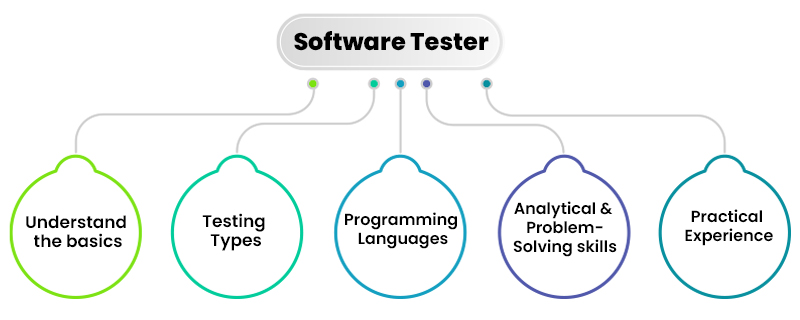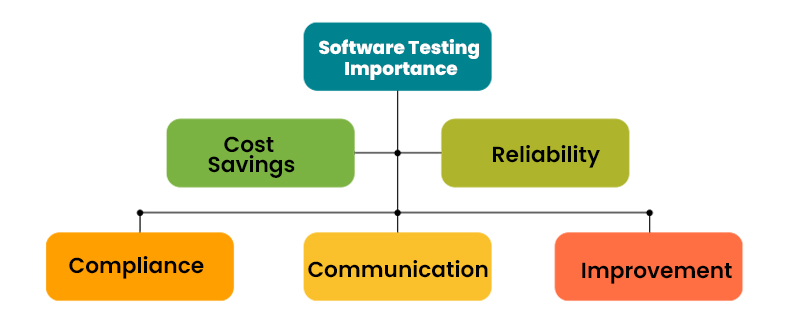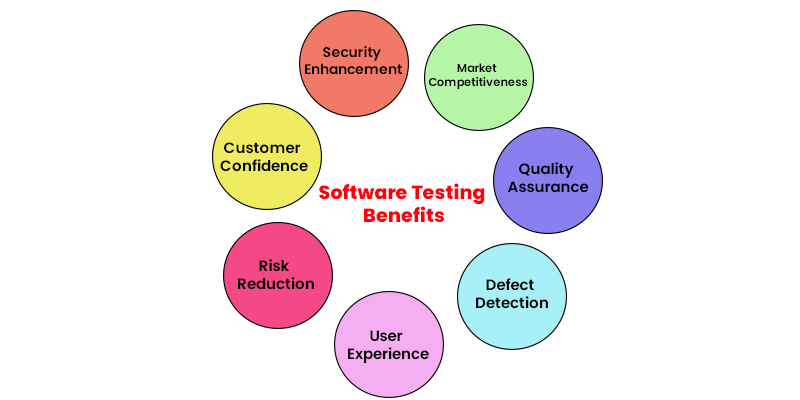In this digital-driven world, a pivotal process is to obtain flawless software. This process is done by Software Testers. Obtaining error-free software through Software Testing is essential for the better functionality of the software application. In this comprehensive blog, we’ll discuss software testing job, their responsibilities, skills, and the steps to start your software testing career and land those most demanded freshers jobs in the field.

Software Testing
Software testing is a significant process in the software development life cycle that involves the evaluation and assessment of a software application or system to spot defects or errors between expected and actual outcomes. The aim of software testing is to make sure that the software functions as intended, meets user requirements, and delivers a high-quality user experience.
Independent Software testing companies serves as a quality assurance mechanism, helping to prevent software defects from reaching end-users, which can lead to negative user experiences, security vulnerabilities, and operational failures. By systematically testing software, developers and quality assurance professionals can identify and rectify issues before the software is released to the public.
The software testing job includes various activities, methodologies, and techniques, including the validation and verification of the software’s functionality, performance, security, and compatibility across different platforms. It can involve both manual testing, where testers manually execute test cases, as well as automated testing, where scripts and tools are used to automate repetitive testing tasks.
Software Testers
Software testers are professionals responsible for evaluating and assessing software applications, systems, and products to ensure their quality, functionality, and reliability. They play a significant role in the software development lifecycle by identifying defects, bugs, and issues in software before it reaches end-users. Software testers work closely with developers, quality assurance teams, and other stakeholders to ensure that the software meets specified requirements and delivers a positive user experience.
Software testers need to have some software tester skills such as a strong attention to detail, analytical thinking, problem-solving skills, and effective communication abilities. They need to be able to identify and replicate defects, provide clear and accurate reports, and work collaboratively within a team environment.
Importance of Software Testing
- Cost Savings: Early issue detection saves time, effort, and resources that would be needed for fixes later.
- Reliability: Tested software is dependable, reducing the chances of crashes or malfunctioning.
- Compliance: Certain industries require cohesion to standards; testing ensures software meets regulations.
- Clear Communication: Testing provides valuable insights through bug reports, aiding effective communication among stakeholders.
- Continuous Improvement: Regular testing supports ongoing software enhancement, adapting to changing needs.
Software testing guarantees that software performs as intended, meeting user needs, industry requirements, and market expectations. It contributes to a reliable and efficient development process, resulting in better software products.
Qualifications
Software testers typically have a degree in computer science or IT. But the role can be preferred by graduates from various educational backgrounds, like
- Chemistry
- Electrical Engineering
- Mathematics
- Physics
You can even start with a lower-level qualification like an HND or foundation degree. Companies might really value a diploma in software, IT, or engineering for this role.
Software Testing Skills
For this job, you should have software tester skills like
- Efficient verbal and written communication skills with the ability to communicate with diverse stakeholders
- Problem-solving skills
- The ability to work well under pressure
- Pay close attention to small detail
- Good technical skills
- The ability to collaborate with a team and work individually
- Be organized and able to finish tasks on fixed deadlines.
- Really like working with technology.
Responsibilities
- Talk to the people using the system to know the scope of the project.
- Collaborate with software developers and project teams.
- Keep an eye on software and applications to make sure they function well.
- Do different types of testing like stress testing, performance testing, functional testing, and scalability testing.
- Create and use test instructions or scripts.
- Run manual tests and automated tests.
- Test in different places like online and on mobile devices.
- Write down and report any problems you find.
- Make sure the quality of the software is good.
- Solve problems and find out why things aren’t working.
- Design tests to reduce risks.
Above mentioned are the roles and responsibilities of software tester.
Working hours
Typically, the working hours will be around 8 to 9 hours a day, usually from 8 in the morning to 6 in the evening, which is the usual office schedule. But because of the type of projects, you might need to work outside of these hours sometimes.
Sometimes, you might need to work in shifts or on weekends. This could happen when new software is being put into use or if a project is happening in different places and time zones.
Salary
- Beginning software testing salary for entry-level software testing roles are £18,000 to £27,000 depending on the location and company.
- After working for three to five years, the salary of a Software Tester can increase significantly. On average, software testers make around £35,000 to £50,000.
Salary amounts change based on the location, your technical knowledge, and the industry you’re working in.
How to Become a Software Tester?
Becoming a software tester goes beyond learning the technical aspects. It requires genuine interest, essential skills, a problem-solving mindset, and a strong understanding of technology.
Understand the Basics
Once you’re intrigued by software testing, the next move is to learn the core concepts. These include testing objectives, principles, methods, stages, feedback, records, and measurements. By understanding these key ideas, testers can make sure that software meets its expected goals and rules. By understanding these basics, software testers can make sure that the software products or systems meet functional and non-functional needs by following the best practices and effectively identifying defects.
Learn Testing Tools
Moving forward in your software testing career involves mastering the use of testing tools. These tools simplify your work and make you more efficient so you can concentrate on finding and fixing problems. Common testing tools include Postman, Selenium, Appium, Jmeter, Rest Assured, Bugasura, JIRA, and more. Each tool comes with its own strengths, and it’s essential to know the basics of how they function and how to use them. This expertise will help you excel in your software testing job opportunities and develop your career.
Learn Testing Types
As a software tester, you should know various testing methods. This involves understanding functional testing to make sure the software meets its set goals, performance testing to see how it works in different situations, security testing to find weaknesses and prevent risks, and usability testing to make it user-friendly. There are more types like compatibility, integration, and regression testing – all help ensure good software quality. By learning about these different methods, you can expand your skills.
Learn Programming Languages
For successful software testing, it’s important to have knowledge of programming languages. These languages are used to make automated tests effective and manual testing quicker. Java, Python, C++, and Ruby are common languages testers use. While learning these languages might take time, there are several online and offline resources to help you acquire these software tester skills and become skilled in programming and scripting languages.
Analytical and Problem-Solving skills
Having good analytical and problem-solving skills really benefits your software testing career. These abilities help you shine in your job and guarantee the software you’re testing is high-quality. You become better at handling tricky info, thinking deeply, and finding out why issues happen. It’s important to tackle each problem with creativity and practical ways to solve it.
Gain Practical Experience
Simply having theoretical knowledge isn’t sufficient to excel as a software tester. You must put that knowledge into action in real situations. You can get hands-on experience by working on projects, doing internships, and attending classes. This practical experience helps you grasp how software testing works, build your skills, and boost your self-assurance. It also lets you learn from your mistakes and develop your software tester skills.
Benefits of Software Testing
Software testing brings numerous benefits to both developers and users. Here are some key advantages:
- Quality Assurance: Testing ensures that software meets specified quality standards, resulting in reliable and robust products.
- Defect Detection: Testing identifies bugs and errors early, reducing the chances of costly fixes later in the development process.
- Enhanced User Experience: Thorough testing leads to software that functions smoothly, providing users with a positive and satisfying experience.
- Risk Reduction: Testing helps uncover potential issues, allowing developers to address them before they become major problems.
- Customer Confidence: High-quality software builds trust among users, boosting brand reputation and customer loyalty.
- Security Enhancement: Thorough testing uncovers vulnerabilities, enabling the implementation of security measures for protecting sensitive data.
- Market Competitiveness: High-quality software sets your product apart, making it more appealing and competitive in the market.
Software testing ensures the creation of reliable, functional, and user-friendly software products that meet expectations, comply with standards and contribute to a positive user experience. The points mentioned above are the benefits of a software testing job.
In conclusion, so Software testing plays a major role in obtaining flawless software. It is very essential for the better functionality of the software application. Its main aim is to make sure that the software performs as intended, meets the user’s needs, and delivers a high-quality user experience. So, in this blog, we explored what software testing is, its importance, and tips for becoming a software tester.






